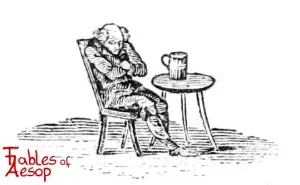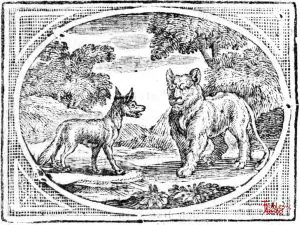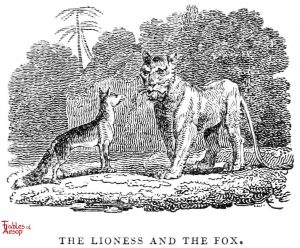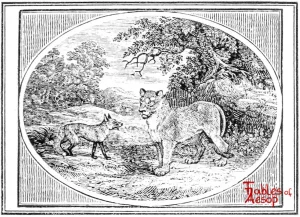Beasts, especially the Fox, were kidding a Lioness about having but one baby a year while they had many. She pointed out that baby was a lion. Lioness won.
Value is in the worth, not in the number.
The beasts were arguing among themselves about which of the animals produced the greatest number of whelps at birth. They laughed at the Lioness when she said she only had one. The Lioness laughed back, saying: “But, that one is altogether a thoroughbred Lion.”

Townsend version
A controversy prevailed among the beasts of the field as to which of the animals deserved the most credit for producing the greatest number of whelps at a birth. They rushed clamorously into the presence of the Lioness and demanded of her the settlement of the dispute. “And you,” they said, “how many sons have you at a birth?” The Lioness laughed at them, and said: “Why! I have only one; but that one is altogether a thoroughbred Lion.”
Moral
The value is in the worth, not in the number.

JBR Collection (The Lioness and The Fox)
The Fox once observed to the Lioness that Foxes were very much to be envied in the matter of fruitfulness. Scarcely a year passed that she, for instance, did not bring into the world a good litter of cubs, while some people, she continued, who had only one young one at a time, and that not more than twice or thrice in their lives, looked down upon everybody else with contempt. This sneer was too pointed to be passed over in silence by the Lioness, who replied with a good deal of fire, “What you say is true; you have a great many young at a time, and often; but what are they? Foxes. I have but one, but remember that that one is a Lion.”

Samuel Croxall (The Lioness and the Fox)
THE Lioness and the Fox meeting together, fell into discourse, and the conversation turning upon the breeding and the fruitfulness of some living creatures above others, the Fox could not forbear taking the opportunity of observing to the Lioness, That, for her part, she thought Foxes were as happy in that respect as almost any other creatures; for that they bred constantly once a year, if not oftener, and always had a good litter of cubs at every birth: and yet, says she, there are those who are never delivered of more than one at a time; and that perhaps not above once or twice through their whole life, who hold up their noses, and value themselves so much upon it, that they think all other creatures beneath them, and scarce worthy to be spoken to. The Lioness, who all the while perceived at whom this reflection pointed, was fired with resentment, and with a good deal of vehemence replied: What you have observed may be true, and that not without reason. You produce a great many at a litter, and often; but what are they? Foxes. I indeed have but one at a time, but you should remember that this one is a Lion.
THE APPLICATION
Our productions, of whatsoever kind, are not to be esteemed so much by the quantity as the quality of them. It is not being employed much, but well, and to the purpose, which makes us useful to the age we live in, and celebrated by those which are to come. As it is a misfortune to the countries which are infested with them, for foxes and other vermin to multiply; so, one cannot help throwing out a melancholy reflection, when one sees some particalars of the human kind increase so fast as they do. But the most obvious meaning of this fable, is the hint it gives us in relation to authors. These gentlemen should never attempt to raise themselves a reputation, by enumerating a catalogue of their productions. Since there is more glory in having written one tolerable piece, than a thousand indifferent ones. And whoever has had the good fortune to please in one performance of this kind, should be very cautious how he ventures his reputation in a second.

Thomas Bewick (The Lioness and The Fox)
The Lioness and the Fox meeting together, fell into discourse, and the conversation turning upon the breeding and fruitfulness of some living creatures above others, the Fox could not forbear taking the opportunity of observing to the Lioness, that for her part, she thought Foxes were as happy in that respect as almost any other creatures; for they bred constantly once a year, if not oftener, and always had a good litter of cubs at every birth; and yet, says she, there are some folks who are never delivered of more than one at a time, and that perhaps not above once or twice in their whole lives, who hold up their noses, and value themselves so much upon it, that they think all other creatures beneath them, and scarce worthy to be spoken to. The Lioness, who all the time perceived at whom this reflection pointed, replied, what you have observed is true. You litter often, and produce a great many at a time; but what are they? Foxes! I, indeed, may have but one at a time; but you should remember that that one is a Lion.
APPLICATION.
Our productions, of whatsoever kind, are not to be esteemed so much by their quantity as by their quality. It is not being employed much, but well, and to the purpose, which will make us useful to the age we live in, and celebrated by those which are to come. As the multiplication of foxes and other vermin is a misfortune to the countries which are infested with them, so one cannot help throwing out a melancholy reflection, when one sees some particular classes of the human kind increase so fast as they do. But the most obvious meaning of this Fable is the hint it gives us in relation to authors. These gentlemen should never attempt to raise themselves a reputation by trumping up a long catalogue of their various productions, since there is more glory in having written one tolerable piece than a thousand indifferent ones; and whoever has had the good fortune to please in one literary performance, should be very cautious how he stakes his reputation in a second attempt.


L’Estrange version (A Lyoness and A Fox)
A numerous issue passes in the world for a blessing; and this consideration made a fox cast it in the teeth of a lyoness, that she brought forth but one whelp at a time. Very right, says the other, but then that one is a lyon.
Moral
‘Tis a common thing to value things more by the number, then by the excellency of them.

Leaena et Sus
Sus et leaena litigabant ad invicem. Sus autem dixit leaenae, “Et tu, in quo te iactas, pro qua re tantam elevaris in superbiam? Labor tuus inanis est, et cum per annum unum labores, non potest habere nisi catulum unum. Ego fecunda et grata sum hominibus, et per duos quosque menses porto quattuordecim porcellos.” Respondit, “Verum est, sed tu paris porcellos, ego leonem.”
Moral
Exemplum est verbosi, qui multa loquitur inutilia. Sapiens autem paucis contentus est verbis.
Perry #257


